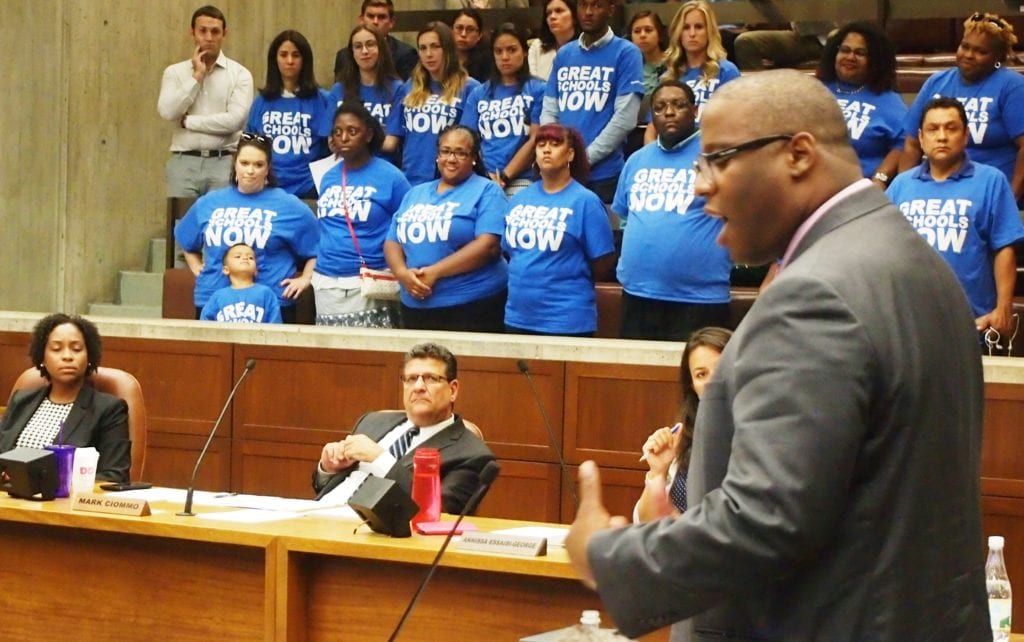
Boston city councilors voted 11-2 last week to pass a resolution against the Question 2 referendum, which calls for lifting the statewide cap on new charter schools in Massachusetts.
City Councilors Andrea Campbell and Joshua Zakim cast the sole votes against the resolution, which initially was sponsored by councilors Tito Jackson and Matt O’Malley.
Jackson and other councilors who spoke stressed that they are not opposed to charters schools, but rather to the funding system that pits charter schools against the districts in which they operate in a competition for state funding.
“This is not a question of being pro- charter schools or a proponent of district schools,” Jackson said. “This is a question, for us, of sustainable funding for the Boston Public Schools and also for the city of Boston.”
Jackson said charter schools cut into $158.2 million in state Chapter 70 education funding allocated to the city, in addition to costing the city $15 million in transportation funding.
“Understand that this is an unfunded mandate that increases year over year,” he said, adding that the ballot question would create 12 new schools a year in the state, without providing additional funding for district or charter schools. “This is actually an issue that hurts the Boston Public Schools, it hurts the current charter schools in the city of Boston,” he said. “The people who are putting this forward are pitting us against each other, which is unfair.”
Arguing against the resolution, Campbell, whose district includes Dorchester and Mattapan, said she heard from many parents who complained about a lack of choices for their children.
“I must represent all parents, regardless of where their children go to school,” she said.
Charter schools receive state funding on a per-pupil basis. When a student enrolls in a charter school, the state redirects Chapter 70 education aid to the charter, taking the funds from the district. While state law mandates that district schools be compensated for a portion of the funds lost to charters, the Legislature has repeatedly underfunded those reimbursements.
“The state has not upheld its end of the bargain,” O’Malley said.
In arguing against Question 2, council members mostly argued that the measure would have adverse effects on the BPS budget. At-large Councilor Ayanna Pressley said increasing the number of charters in Boston without increasing state funding would unleash a “tsunami of devastation on our public schools.”
Campbell and Zakim did not speak in favor of the ballot question, but argued against the council taking sides. Campbell suggested that councilors instead lobby at the State House for more school funding.

City Councilor Matt O’Malley makes the case for a resolution against Ballot Question 2, which would lift the statewide cap on charter schools in Massachusetts. O’Malley co-sponsored the resolution, which passed 11-2.
Zakim said it was too soon for the council to take a position.
“I’m personally undecided about Question 2,” he said. “It’s a little bit early in the process.”
At today’s council meeting, about 20 charter school supporters wearing blue and white Great Schools Massachusetts T-shirts stood during the debate on Jackson and O’Malley’s measure, at one point marching in place. Afterwards, one charter school parent said she was disappointed in the vote.
“When it’s election time, they crawl through our neighborhoods and ask for our support,” said Daphne Lawson, a parent of two students at KIPP Academy. “I’m glad they took a roll call so we know who to get out of office.”
The Boston City Council vote comes as the television advertising war heats up. Save Our Public Schools, the Massachusetts Teachers Association-backed coalition organized in opposition to question 2 is airing a television ad as part of its $12 million campaign to defeat the ballot measure. Great Schools Massachusetts, the pro-charter expansion campaign, recently reserved $6.5 million in advertising as part of its $18 million campaign to lift the state-imposed cap on charter school expansion.
The $30 million ballot campaign will be the most costly in Massachusetts history. And that funding doesn’t include the more than $7 million in charitable dollars tied to New York hedge funds that were pumped in to pro-charter groups last year, according to Maurice Cunningham, an associate professor of political science at UMass Boston who posted his accounting of the contributions on WGBH’s website.
At stake are hundreds of millions of dollars in public school spending that charter expansion opponents say would constitute public funding of privately-run schools.
“Nobody is against charter schools,” said former teacher and education activist Bob Marshall, speaking after the council vote. “But this ballot question has taken on a life of its own. You have people in the background who work for hedge funds who are trying to privatize the public school system.”
The influence of these groups has been felt by a wide range of Boston elected officials, many of whom have received campaign contributions from the pro-charter group Democrats for Education Reform.
In making vocal its opposition to Question 2 the Boston City Council joins more than 50 school committees, the Massachusetts Association of School Superintendents, the Massachusetts Parent Teacher Association and the Massachusetts Municipal Association — an association of boards of selectmen and other municipal government representatives — who have done so.
Also last week, members of the National Association for the Advancement of Colored People voted in favor of a resolution calling for a moratorium on the expansion of charter schools in the United States, citing fiscal mismanagement, punitive disciplinary policies and a lack of local municipal control over the management of the schools. The Movement for Black Lives — which is affiliated with the Black Lives Matter movement — called for a moratorium on the expansion of charter schools.







